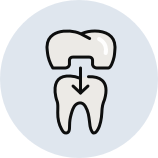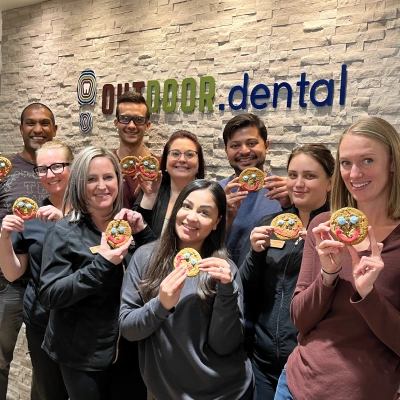That dull ache or sharp pain in your jaw can be more than just an annoyance. It can interfere with eating, talking, and even enjoying a beautiful day outside in Calgary. If you’re experiencing persistent jaw discomfort, getting it checked is important. For some, their family dentist may find that wisdom teeth are the hidden source of the trouble.
Yes, your wisdom teeth can absolutely be a cause of jaw pain, which may be temporary and resolve after wisdom teeth removal, or could be recurring depending on the underlying issue. When these molars don’t have enough room to grow in properly, they create pressure and other complications that radiate discomfort throughout your jaw and head.
The Connection Between Your Wisdom Teeth & Jaw Pain
Your wisdom teeth, or third molars, are the last set of teeth to arrive. For many people, our jaws aren’t large enough to accommodate these latecomers. This lack of space is the root of many problems related to wisdom teeth.
When a wisdom tooth tries to push through into a crowded space, it can get stuck or grow at an odd angle. This is known as impaction. The force of the erupting tooth against your other teeth or the jawbone itself can lead to persistent pain, stiffness, and soreness. Removal of impacted wisdom teeth is often recommended to prevent issues from arising in the future.
Signs Your Wisdom Teeth Are the Problem
It can be tricky to pinpoint the exact cause of jaw pain on your own. However, certain clues may point toward your wisdom teeth as the source. A visit with your dentist can help confirm what’s happening in your mouth.
Look out for these common symptoms:
- Pain or stiffness in the jaw near the back of your mouth
- Discomfort when you chew or open your mouth wide
- Swollen or tender gums around the back molars
- Bad breath or an unpleasant taste that doesn’t go away (a condition known as halitosis)
- Headaches that seem to start from your jaw area
Common Issues Caused by Wisdom Teeth
When wisdom teeth can’t emerge correctly, they can lead to oral health issues. These issues often go beyond simple discomfort.
Cysts
In some cases, a fluid-filled sac called a cyst can form around an impacted wisdom tooth. If left untreated, a cyst can damage the jawbone, nerves, and nearby teeth. Early detection is important to preventing more serious complications.
Crowding & Orthodontic Concerns
If your jaw lacks enough space for these molars, erupting wisdom teeth can have a domino effect on your smile. They can push other teeth forward, causing them to shift, overlap, and become crooked. This can be especially frustrating if you’ve had braces and already worked to align those teeth before.
This shifting can also affect your bite and jaw alignment, contributing to discomfort. If you notice your teeth moving, you may want to discuss orthodontics with our team. They can help you understand your options for restoring your smile’s alignment.
Infection & Gum Disease
Wisdom teeth that only partially break through the gums create a flap of tissue that is very hard to keep clean. Food particles and bacteria can easily get trapped underneath this flap. This can lead to a painful infection called pericoronitis.
Symptoms of pericoronitis include discomfort, red, swollen gums and sometimes difficulty opening your mouth. Because the area is so difficult to reach with a toothbrush or floss, it also increases the risk of gum disease and decay for both the wisdom tooth and the molar next to it.

How to Soothe Wisdom Tooth & Jaw Discomfort at Home
While you’re waiting for your dental appointment, you don’t have to endure the discomfort. A few simple home remedies can provide temporary relief from the soreness and swelling. These steps can help you manage discomfort, but they are not a substitute for professional dental care.
Simple At-Home Techniques
These tips help reduce inflammation and keep the area clean, which can ease your symptoms for a short time.
- Saltwater rinse: Mix 1/2 teaspoon of salt into a cup of warm water. Swish the solution gently in your mouth for around 30 seconds to help clean the area and soothe irritated gums.
- Cold compress: Apply an ice pack or a cold compress wrapped in a towel to your cheek for 15-20 minutes at a time. This can help reduce swelling and numb the painful area.
- Over-the-counter pain relief: Non-prescription pain relievers may help manage the discomfort associated with toothaches and gum problems. You can follow the instructions on the packaging for appropriate use, and always make sure to check with your dentist or doctor if you have medical conditions or take other medications.
When to See Your Dentist
Home care can help, but it will not solve the underlying problem. If you have persistent jaw pain, it’s a clear signal from your body that you should schedule a visit for a professional evaluation.
During your appointment, the dentist can perform a thorough examination. This may include imaging like our CBCT scanner to check the position of your wisdom teeth and look for issues like impaction or cysts. From there, we can develop a clear plan to help you find relief.
Don’t Let Wisdom Teeth Hold You Back
Don’t let jaw pain keep you from your next adventure on the trails or ski hill. At Outdoor Dental, our team is here to provide the thorough, friendly care you deserve. Book an appointment with our trusted team in Calgary’s Seton community and take the first step toward a more comfortable jaw.























